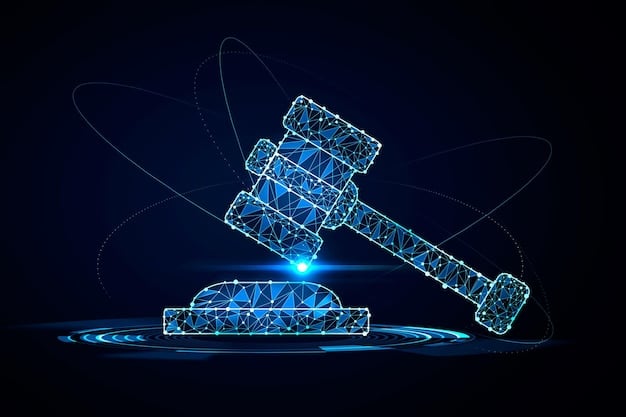US Crackdown on Big Tech: Antitrust Lawsuits & Implications

The US government’s antitrust lawsuits against Big Tech aim to curb monopolistic practices and foster fair competition, potentially reshaping the digital economy and impacting innovation, consumer choice, and the global technology landscape.
The burgeoning digital economy has brought unprecedented convenience and innovation, yet it has also concentrated immense power in the hands of a few technology giants. The US government’s escalating efforts to address this concentration, particularly through The US Government’s Crackdown on Big Tech: Antitrust Lawsuits and Their Implications, signal a pivotal moment for the industry and the broader economy. What do these legal challenges truly mean for the future of technology and competition?
Understanding the Antitrust Landscape Against Big Tech
For decades, antitrust law in the United States largely followed the “consumer welfare standard,” focusing on whether a company’s actions harmed consumers through higher prices or reduced quality. This framework often struggled to address the unique characteristics of digital markets, where many services are free, and competition manifests in less obvious ways, like data collection or platform control.
However, recent years have seen a significant shift in perspective within the US government and academic circles. There’s a growing recognition that market power in the tech sector, even without direct price increases, can stifle innovation, limit consumer choice, and consolidate undue influence. This evolving understanding has laid the groundwork for the current wave of antitrust enforcement targeting some of the world’s most valuable companies.
The Shift in Antitrust Philosophy
The traditional approach often overlooked critical aspects of digital markets. For instance, if a platform offers a “free” service, how does one measure consumer harm under a price-centric model? Regulators and legal scholars began to argue that non-price factors, such as data privacy, algorithmic bias, and the suppression of nascent competitors, warranted greater consideration. This philosophical pivot has empowered regulators to pursue cases that might have been dismissed under older interpretations.
- Shifting focus from price to broader market impacts.
- Considering non-price harms like data collection and innovation stifling.
- Recognizing network effects and platform dominance as key factors.
- Increased emphasis on potential future harms to competition.
The federal government’s renewed interest in antitrust enforcement also reflects broader societal concerns about the power of tech giants. From content moderation to election integrity, these companies wield considerable influence over public discourse and economic activity. The lawsuits thus also represent an attempt to reassert public control over increasingly powerful private entities.
Key Antitrust Lawsuits: A Closer Look
The US Department of Justice (DOJ) and the Federal Trade Commission (FTC), alongside various state attorneys general, have launched an array of high-profile antitrust challenges against leading tech firms. These cases often target specific business practices, mergers, or market dominance in particular areas, aiming to dismantle perceived monopolies or alter anti-competitive behaviors.
Google: Search, Advertising, and App Store Dominance
Google has been a primary target, facing multiple lawsuits from both federal and state authorities. The core allegations against Google generally revolve around its dominant positions in search, digital advertising, and the Android app ecosystem. For example, the DOJ’s lawsuit against Google’s search business alleges the company maintains its monopoly through exclusionary agreements with device manufacturers and wireless carriers, making it the default search engine on billions of devices.
Separately, several states have sued Google over its advertising technology business, claiming the company unlawfully manipulates the ad tech market to its advantage, harming publishers and advertisers. Another significant challenge has focused on Google’s Play Store and its alleged monopolistic control over app distribution on Android devices, including its fee structures and restrictions on third-party payment systems.
Meta (Facebook): Social Networking and Acquisitions
Meta, formerly Facebook, has faced intense scrutiny, particularly regarding its acquisitions of Instagram and WhatsApp. The FTC’s lawsuit alleges that Meta engaged in a “buy or bury” strategy, acquiring nascent competitors to eliminate potential threats to its social networking dominance. The core argument is that these acquisitions were anti-competitive from their inception, aiming to solidify a monopoly rather than promote genuine innovation through competition.
The FTC seeks to unwind these acquisitions, which would represent a significant structural remedy unprecedented in recent antitrust history for tech. This case highlights a shift towards scrutinizing historical mergers that were previously cleared by regulators, indicating a more aggressive stance on preventing market power consolidation.
Amazon: Online Retail and Seller Practices
Amazon’s vast e-commerce empire and its multifaceted business model have also drawn antitrust attention. Lawsuits against Amazon often focus on its dual role as both a marketplace operator and a direct seller of goods. Critics allege that Amazon leverages its platform data to unfairly compete with third-party sellers, promotes its own products over those of others, and imposes restrictive terms on sellers that limit their ability to offer lower prices elsewhere.
- Allegations of self-preferencing and using seller data.
- Concerns about restrictive policies for third-party merchants.
- Impact on competition in online retail and logistics.
These cases aim to address how Amazon’s market power might harm competition and consumer choice, despite its apparent convenience and low prices. The legal battles are complex, given the interconnected nature of Amazon’s services, from retail to cloud computing.
Apple: App Store, Mobile Ecosystem, and Hardware Control
Apple faces antitrust challenges primarily centered on its App Store and its control over the iOS ecosystem. Developers and regulators argue that Apple’s strict policies, including mandatory use of its in-app payment system and high commissions (up to 30%), stifle competition and innovation, and ultimately harm developers and consumers. There are also concerns about Apple’s bundling practices and how its hardware and software integrations might disadvantage competitors.
The lawsuits against Apple seek to break open its tightly controlled ecosystem, potentially allowing for alternative app stores, different payment methods, and more flexibility for developers. This would represent a significant shift for a company known for its integrated hardware and software experience.
Implications for Big Tech Companies
The ongoing antitrust crackdown carries profound implications for the targeted tech giants, extending far beyond the immediate legal battles. These implications touch upon business models, innovation strategies, and even their intrinsic value.
Potential Outcomes for Big Tech
The ultimate outcomes of these lawsuits are uncertain. They could range from minor behavioral remedies to significant structural changes. Behavioral remedies might include stricter rules on data usage, increased interoperability requirements, or changes to platform policies. Structural remedies, on the other hand, could involve breaking up companies, forcing divestitures of key assets (like Instagram or WhatsApp), or mandating the separation of different business units.
Even if companies avoid forced divestitures, the threat of stricter regulation and ongoing legal scrutiny could compel them to proactively alter their practices. This might include adjusting app store fees, opening up ecosystems, or being more transparent about algorithms and data usage. Litigation itself is also a massive financial and reputational burden, diverting resources and attention from core business operations.
Impact on Innovation and Business Strategies
The lawsuits could fundamentally reshape how Big Tech innovates. Companies might become more cautious about acquiring smaller competitors, opting instead to build new features internally or partner more openly. This could foster more organic innovation but might also slow down growth by acquisition, a common strategy for tech giants.
Furthermore, if companies are forced to open their platforms or reduce their control, it could lead to more robust competition in specific market segments. For instance, if Apple’s App Store policies are changed, it could unleash a wave of new apps and services that were previously hindered by the existing rules. Conversely, some fear that excessive regulation could stifle risk-taking and slow down the pace of technological advancement, though this is a subject of intense debate.

Broader Economic and Societal Impacts
Beyond the tech companies themselves, the antitrust crackdown has far-reaching implications for the broader economy, consumers, and civil society. These cases are not just about market structure; they touch upon issues of fairness, equity, and the role of technology in a democratic society.
Impact on Consumers
For consumers, the outcomes of these lawsuits could be a mixed bag. On one hand, increased competition could lead to more innovative products, better services, and potentially lower prices (or better value from “free” services). If platforms are forced to be more open, it could also allow consumers greater choice and control over their data and digital experiences.
On the other hand, some argue that breaking up highly integrated services could lead to a less seamless user experience. For instance, if Instagram and WhatsApp were spun off from Meta, would their integrations with Facebook remain as smooth? There’s also the concern that increased compliance costs for tech companies could eventually be passed on to consumers, though this is often debated by economists.
Impact on Smaller Businesses and Startups
One of the primary goals of antitrust enforcement is to level the playing field for smaller businesses and startups. If established tech giants are prevented from engaging in anti-competitive practices, it could create more opportunities for new entrants to compete, innovate, and grow. This could lead to a more dynamic startup ecosystem, fostering new technologies and business models.
By curbing the power of dominant platforms, the government aims to reduce “killer acquisitions” – where large companies buy up small but promising startups to prevent them from becoming future competitors. This could encourage more venture capital investment in early-stage companies, knowing that their growth potential might be less threatened by established players.
Policy and Regulatory Environment Changes
The current wave of lawsuits is likely to precipitate significant changes in the broader policy and regulatory environment for technology. It could lead to new legislation aimed at digital markets, refining antitrust laws to better address network effects, data monopolies, and platform power. Congress is actively debating new bills that would update competition laws for the digital age, spurred by these ongoing legal battles.
This renewed focus on tech regulation could also encourage other countries to pursue similar antitrust actions, creating a more harmonized global regulatory landscape for technology companies. The outcomes in the US could set precedents for how digital markets are regulated worldwide, affecting international trade and investment in the tech sector.
Challenges and Criticisms of the Crackdown
While the antitrust crackdown has garnered support from various stakeholders, it is not without its critics and significant challenges. The complexity of digital markets, the rapid pace of technological change, and fundamental disagreements over the appropriate role of government intervention all contribute to the difficulty of these legal battles.
Defining “Monopoly” in the Digital Age
One of the persistent challenges is precisely defining what constitutes a “monopoly” or “anti-competitive behavior” in the fast-evolving digital space. Traditional antitrust concepts, developed for industrial-era markets, often grapple with the nuances of platforms that offer free services, derive value from user data, and operate across multiple interconnected markets. Is market share the sole determinant, or should network effects, data advantages, and ecosystem control be given greater weight?
- Difficulty applying traditional antitrust concepts to digital markets.
- Challenges in measuring harm when services are “free.”
- The fluid nature of competition in rapidly changing tech sectors.
The speed of technological change also means that by the time a lawsuit concludes, the market landscape may have entirely transformed, making the remedies proposed potentially obsolete. This “durable monopoly” problem is a core argument against prolonged legal battles in favor of more agile regulatory approaches.
Technological Innovation vs. Competition
A frequent criticism of aggressive antitrust actions is the potential for stifling innovation. Proponents of Big Tech argue that large companies, with their vast resources, economies of scale, and access to top talent, are uniquely positioned to invest in risky, long-term research and development that drives significant technological breakthroughs. They contend that breaking up these companies could fragment resources and reduce the incentive for large-scale innovation.
Conversely, advocates of stronger antitrust enforcement argue that concentration of power actually reduces innovation in the long run by eliminating competitive pressure and discouraging new entrants. They suggest that small, agile startups are often the source of disruptive innovation, but they are either acquired or crushed by dominant players before they can meaningfully compete.

Enforcement Challenges and Legal Precedents
The sheer scale and complexity of these antitrust cases pose enormous challenges for regulators. Litigation can drag on for years, consuming vast resources and facing multiple appeals. Furthermore, many of these cases seek to establish new legal precedents for digital markets, which means there’s less settled law to rely upon, making the outcomes inherently unpredictable.
The remedies sought are also highly contentious. Forcing a company to divest a core business or unwind historical mergers is an extreme measure with potentially significant economic ripple effects. Courts are often reluctant to impose such drastic measures without overwhelming evidence of severe and durable harm to competition, making the legal bar for success very high for the government.
The Path Forward: Regulation, Legislation, and Global Harmonization
The antitrust crackdown is just one facet of a broader re-evaluation of how societies should govern powerful digital platforms. The path forward will likely involve a combination of continued enforcement, new legislative efforts, and increasing international cooperation.
New Legislative Approaches
Recognizing the limitations of existing antitrust laws in dealing with digital markets, there is significant momentum in Congress for new, sector-specific legislation. Proposals often include ex-ante regulations (rules enacted beforehand) rather than ex-post enforcement (after harm has occurred). These could include mandating interoperability, data portability, prohibitions on self-preferencing by platform owners, or increased transparency requirements for algorithms.
Such legislation could provide clearer rules of the road for tech companies, reducing the need for lengthy and unpredictable antitrust litigation. However, crafting effective legislation that balances innovation with competition and consumer protection is a complex undertaking, requiring deep understanding of technology and market dynamics.
Global Cooperation and Divergence
Antitrust enforcement against Big Tech is not unique to the US. The European Union, the UK, and other jurisdictions globally are also pursuing their own investigations and enacting new digital market regulations (e.g., the EU’s Digital Markets Act and Digital Services Act). There is a growing need for international cooperation to address the global nature of these companies and their operations.
However, there are also areas of divergence in regulatory philosophies and enforcement priorities. Harmonizing these approaches to avoid a patchwork of conflicting regulations will be a significant challenge. The outcomes of the US lawsuits will undoubtedly influence global debates and may even spur further international actions.
Beyond Antitrust: Data Privacy and Content Moderation
While antitrust focuses on market power, the broader conversation around Big Tech also encompasses critical issues like data privacy and content moderation. These are often intertwined with market dominance, as control over user data can create significant competitive advantages, and the sheer scale of platforms makes content moderation a massive societal challenge.
Future regulatory efforts will likely address these areas concurrently. Comprehensive data privacy legislation (like Europe’s GDPR) is increasingly being debated in the US, and there’s an ongoing discussion about Section 230 of the Communications Decency Act, which provides liability protections for online platforms regarding user-generated content. These separate but related policy areas will collectively shape the future of Big Tech and the digital economy.
| Key Point | Brief Description |
|---|---|
| ⚖️ Antitrust Shift | Evolving focus from consumer price to broader market competition and innovation. |
| 🚀 Key Lawsuits | Google, Meta, Amazon, and Apple face challenges over dominance and practices. |
| 🌐 Broad Impacts | Potential changes for consumers, startups, and global regulatory landscape. |
| 💡 Innovation Debate | Controversy over whether lawsuits spur or stifle technological advancement. |
Frequently Asked Questions About Big Tech Antitrust
The US government is increasingly concerned that Big Tech companies have amassed too much power, stifling competition and innovation. This renewed focus comes from an evolving understanding that traditional antitrust frameworks didn’t fully capture harms in digital markets, coupled with public concern over tech giants’ influence on society and the economy.
Google faces allegations regarding its dominance in search and digital advertising, as well as its app store practices. Meta (formerly Facebook) is primarily targeted for its acquisitions of Instagram and WhatsApp, which regulators argue were designed to eliminate emerging competitors and maintain its monopoly in social networking services.
For consumers, potential outcomes include more innovation, better services, and increased choice due to heightened competition. However, some argue that breaking up integrated services might lead to less seamless user experiences or potentially higher costs if compliance burdens are passed on through various services.
While possible, breaking up companies is a drastic structural remedy that courts are often hesitant to impose. Regulators are seeking such outcomes in some cases, like the FTC’s lawsuit against Meta regarding Instagram and WhatsApp. However, many lawsuits might lead to behavioral remedies, such as changes in business practices or platform policies, rather than full divestitures.
The long-term implications could include a reshaped competitive landscape, potentially fostering more startups and varied innovations. It may also lead to new legislation tailored for digital markets, increasing regulatory scrutiny, and influencing global approaches to tech governance, pushing companies towards more open and less monopolistic practices.
Conclusion
The US government’s antitrust crackdowns on Big Tech represent a significant shift in regulatory philosophy, moving beyond traditional price-centric views to address broader issues of market power, competition, and innovation in the digital age. These lawsuits, targeting dominant players like Google, Meta, Amazon, and Apple, aim to recalibrate the balance between unchecked corporate power and public interest. While the legal battles are complex and their outcomes uncertain, their implications are profound, potentially reshaping business models, spurring new legislative efforts, and fostering a more dynamic and equitable digital economy for consumers and smaller businesses alike. The outcomes of these cases will undoubtedly set precedents for how technology is governed, not just in the US, but across the globe.





